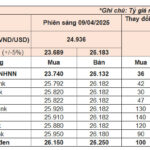Vietnam’s Gold Price Gap with the World: What’s Causing the Widening Differential?
This morning (May 7th), the SJC gold bar price was listed at VND 122.7 million per tael, a premium of over VND 16 million per tael compared to the international gold price. This returns the domestic gold price gap to its previous record high, prior to the State Bank of Vietnam’s intervention measures, which included gold bar auctions and direct sales to state-owned banks for distribution to the public.
In a recent report to the National Assembly on the implementation of resolutions regarding questioning, the Governor of the State Bank of Vietnam stated that in 2024, the bank implemented comprehensive solutions to enhance the management of the gold market and address the significant price differential between domestic and international gold prices, as directed by the Government and the Prime Minister.
The State Bank of Vietnam injected gold bars into the market through auctions and direct sales, significantly narrowing the gap between domestic SJC gold bar prices and world gold prices. The bank also coordinated with relevant ministries and branches to inspect the gold business activities of several units and enterprises, taking steps to rectify these operations. Information from the inspection was transferred to authorized agencies for verification, investigation, and handling in accordance with regulations, and the inspection conclusion is currently being finalized.
As a result, by the end of 2024, the price difference between domestic SJC gold bars and world prices had been controlled and maintained within an appropriate range, falling from a peak of about 25% to VND 3-5 million per tael (equivalent to about 5-7%).
However, in the first months of 2025, international gold prices repeatedly broke previous records. The State Bank of Vietnam identified three reasons for the increase in international gold prices:
Firstly, political instability, military conflicts, and strategic competition intensified globally. Secondly, many central banks and investment funds increased their gold purchases to supplement foreign exchange reserves, significantly impacting gold prices. Lastly, US President Donald Trump’s announcement of high retaliatory tariffs against countries worldwide negatively affected investor sentiment and global economic growth, driving investment capital towards gold.

Vietnamese citizens queue patiently to buy gold at various shops as gold prices soar.
Until the beginning of April, the price difference between domestic and international gold prices continued to be controlled and maintained within a range of VND 3-5 million per tael (equivalent to 5-7%); at some points, it was only about VND 1 million per tael (equivalent to 1-2%) at the beginning of the year. However, the State Bank of Vietnam also acknowledged that as of April 23, the difference between domestic SJC gold bar prices and converted world prices was about VND 14.48 million per tael, equivalent to a differential of 13.62%.
The State Bank of Vietnam identified several reasons for the widening gold price gap in April. Firstly, there was an expectation of continued increases in world gold prices due to the Trump administration’s trade policies, which were expected to negatively impact the global economy; the unpredictable monetary policy path of the US Federal Reserve (Fed); tense world geopolitical situation; and potential commodity price shocks that could drive up gold demand.
Secondly, the supply of gold bars in the market has not increased since the beginning of 2025, and the foreign exchange and gold markets have been relatively stable, so the State Bank of Vietnam has not had to intervene in the market during this period.
In addition to these reasons, the State Bank of Vietnam stated that there may be enterprises and individuals taking advantage of market fluctuations to speculate, drive up prices, and profit from the situation.
Decree 24 to Be Amended Through an Abbreviated Process
Despite the high domestic gold prices, the State Bank of Vietnam affirmed that these fluctuations have not yet affected monetary policy management and macroeconomic stability. The bank will continue to closely monitor the domestic and international gold markets, coordinate with relevant agencies to stabilize the gold market within its authority, and take measures to stabilize the gold market.
Looking ahead, the State Bank of Vietnam expects the gold market to remain truly stable but acknowledges that it is still influenced by psychological and expectation factors and carries risks that could impact the monetary and foreign exchange markets.
The bank believes that in addition to its own solutions, the stable development of the gold market requires the synchronized participation of ministries, branches, and localities, in accordance with the direction of the Government and the Prime Minister.
The State Bank of Vietnam’s orientation for the coming time is to continue to do well in communication to promptly provide information on orientations, solutions, and gold market management policies to stabilize the market psychology. The bank will also urgently build a decree amending and supplementing a number of articles of Decree No. 24 through an abbreviated process.
Furthermore, the State Bank of Vietnam will continue to coordinate with relevant ministries and branches (Ministry of Public Security, Ministry of Industry and Trade, Ministry of Finance, etc.) to strengthen the inspection and examination of gold business activities of gold business enterprises, gold bar distribution shops and agents, and other subjects participating in the gold market.
Unveiling MBV’s (OceanBank) Financial Status Post-Compulsory Transfer
Military Commercial Joint Stock Bank (MB – Code: MBB) has released documents for the upcoming 2025 Annual General Meeting of Shareholders. These documents reveal insightful financial data regarding OceanBank (now MBV), both before and after its transition to MB’s management.





















